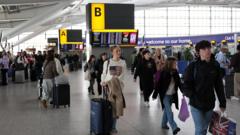Was Heathrow Airport Targeted by a Cyber-Attack on Its Check-In System?

Published: 2025-09-20 09:10:22 | Category: technology
Heathrow Airport has recently been affected by a significant cyber-attack targeting an electronic check-in and baggage system, leading to delays and disruptions. This incident is part of a broader issue impacting several European airports, including Brussels and Berlin, due to a technical fault associated with software from Collins Aerospace. Passengers may experience longer waiting times as airports revert to manual check-in processes.
Last updated: 05 October 2023 (BST)
Understanding the Cyber-Attack Impacting European Airports
The recent cyber-attack has raised concerns about the vulnerabilities within the aviation sector's electronic systems. With airports like Heathrow, Brussels, and Berlin experiencing significant disruptions, it is vital to understand the implications of such incidents, the underlying technology involved, and the measures being taken to resolve these issues.
Key Takeaways
- Heathrow Airport has reported delays due to a cyber-attack affecting its check-in and baggage systems.
- Brussels Airport has shifted to manual check-in processes as a result of the cyber-attack.
- Collins Aerospace, the software provider, has acknowledged the disruption and is working on a resolution.
- The impact is currently limited to electronic check-ins and baggage drop-offs.
- Airlines are implementing manual operations to mitigate delays.
What Happened?
On Friday night, multiple European airports experienced a cyber-attack that affected their electronic check-in and baggage systems. Heathrow, one of the busiest airports in the world, confirmed that passengers might face delays due to a "technical issue" stemming from software provided by Collins Aerospace.
Brussels Airport responded to this disruption by reverting to manual check-in processes, causing additional delays and frustration among travellers. Similarly, Berlin's Brandenburg Airport reported longer waiting times attributed to a “technical issue at a system provider operating across Europe.”
The Role of Collins Aerospace
Collins Aerospace, a subsidiary of RTX, is a major provider of aviation technology, including check-in and baggage systems. Following the incident, the company released a statement acknowledging the cyber-related disruption affecting its systems at select airports. They emphasised that while the impact is significant, it is manageable through manual check-in operations.
Why Does This Matter?
The implications of a cyber-attack on airports are profound. Not only do they lead to immediate disruptions and inconveniences for passengers, but they also raise critical questions about the security of aviation infrastructure. With growing reliance on technology for operational efficiency, the vulnerabilities exposed by such attacks can have cascading effects on the entire industry.
The Broader Context of Cybersecurity in Aviation
As airports increasingly adopt advanced technologies to streamline operations, the risk of cyber-attacks has escalated. This incident is not isolated; it reflects a worrying trend where critical infrastructure becomes a target for malicious actors. In recent years, several airports and airlines have faced similar breaches, underscoring the need for robust cybersecurity measures.
Immediate Response and Mitigation Efforts
Following the attack, airports are taking swift action to mitigate the impact on passengers. Manual check-in and baggage handling processes have been implemented to ensure that operations continue despite the technical difficulties. This approach aims to minimise delays and maintain a level of service that passengers expect.
What Passengers Should Expect
Travellers flying from affected airports should prepare for potential delays. Here are a few tips to ensure a smoother experience:
- Arrive earlier than usual to accommodate longer waiting times.
- Check with airlines for the latest updates on check-in procedures and flight statuses.
- Be prepared for manual check-in processes and possible baggage handling delays.
Long-Term Considerations for Cybersecurity in Airports
The attack on Heathrow and other airports highlights the urgent need for enhanced cybersecurity frameworks within the aviation industry. As technology continues to evolve, so too must the strategies to protect against cyber threats. Key considerations include:
- Investing in advanced cybersecurity technologies and training for airport staff.
- Collaboration between airports and technology providers to strengthen system security.
- Regular audits and assessments to identify vulnerabilities in existing systems.
Future of Aviation Security
Looking ahead, it is crucial for airports and airlines to prioritise cybersecurity as an integral part of their operational strategies. Government regulations may also evolve to enforce stricter security measures across the industry. The goal is to ensure that such incidents become less frequent and that responses to potential threats are swift and effective.
Conclusion
The recent cyber-attack affecting Heathrow and other European airports serves as a wake-up call for the aviation industry. While immediate measures are being taken to manage disruptions, the long-term implications for cybersecurity must not be overlooked. Ensuring the safety and efficiency of air travel requires ongoing vigilance and investment in technology and training. As the landscape of cyber threats continues to evolve, how will airports adapt to safeguard their systems and passengers?
#CyberSecurity #AviationSafety #HeathrowAirport
FAQs
What caused the delays at Heathrow Airport?
The delays at Heathrow Airport were caused by a cyber-attack affecting an electronic check-in and baggage system provided by Collins Aerospace. This led to operational disruptions and longer waiting times for passengers.
Are other airports affected by the same cyber-attack?
Yes, airports such as Brussels and Berlin have also reported disruptions due to the cyber-attack, leading to manual check-in operations and longer waiting times for passengers.
What measures are being taken to resolve the issue?
Collins Aerospace is actively working to resolve the issue. In the meantime, airports are implementing manual check-in and baggage handling processes to mitigate delays and maintain service levels.
How can passengers prepare for potential delays?
Passengers should arrive earlier than usual, check with airlines for updates on procedures, and be ready for possible manual check-in processes and baggage handling delays.
What are the long-term implications of this cyber-attack?
The long-term implications include a potential increase in cybersecurity measures across the aviation industry, with an emphasis on protecting critical infrastructure from cyber threats in the future.



